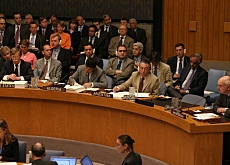Report slams UN over corporate governance

The Swiss member of a panel examining the United Nations oil-for-food programme tells swissinfo of a "deficit of corporate governance" at the world body.
Lawyer Mark Pieth was speaking after the publication of the committee’s final report, which slammed the UN for operating the now-defunct programme in a corrupt and wasteful manner.
The report, published in New York on Wednesday, strongly criticises UN Secretary-General Kofi Annan, his deputy and members of the UN Security Council for mismanaging the humanitarian scheme which operated in Iraq from 1996 to 2003.
Pieth, a professor of criminal law at Basel University, is one of three investigators charged last April with probing allegations that individuals and firms from around 50 countries helped the former Iraqi leader Saddam Hussein to profit from the programme.
The inquiry’s findings come exactly one week before a key UN summit where world leaders will meet to discuss – among other things – reform of the organisation.
swissinfo: What is the main thrust of the findings of the final report?
Mark Pieth: We are saying that the UN was simply not in a position to run the [oil-for-food] programme. And that’s also what the Secretary General has said today – that they probably shouldn’t have done it.
The problem is that the UN… is increasingly taking on pro-active operational roles even though it hasn’t changed or adapted its structures in the last 60 years. We have a massive deficit of corporate governance and what we do [in this report] is explain in great detail over 900 pages how things went wrong.
swissinfo: What role did Switzerland play in the whole affair?
M.P.: Switzerland has a role on three levels, above all in banking. You have to break that down again into two sub-sections.
Firstly a lot of people tried to use the banking system for money-laundering purposes, and the second element is that a very substantial part of the financing of the oil deals went through Geneva. This is not negative in itself but it brings an exposure with it.
And then you have the second aspect, the oil intermediaries or oil dealers. Switzerland has a lot of these oil dealers domiciled in either Zug or Geneva and that brings a lot of the programme into Switzerland.
Thirdly you had Swiss companies selling humanitarian goods and paying surcharges [to the Iraqi government].
swissinfo: What do you feel you have achieved through your investigations and this report?
M.P.: [In the report] I think we’ve made our point very forcibly that we’re serious about reorganisation of the UN.
We have said the same thing to the Security Council. We drove that point home and they were quite impressed and every member of the council reacted to us.
swissinfo: Are you optimistic that this report will act as a catalyst for reform of the UN?
M.P.: Yes, I hope so. They have a unique chance to do something now but we’ll have to [wait and] see what they do.
swissinfo: Are you satisfied with the level of cooperation you received from UN personnel?
M.P.: The UN has been very helpful, although not all countries have. Switzerland has been very helpful indeed, especially with a difficult topic, namely banking records. In other countries it’s been more mixed… for instance in the United States some agencies have been helpful, while others have been totally unhelpful.
swissinfo: What comes next for the committee?
M.P.: In October we’ll be coming out with the very final report on the role companies played in the programme. We have sent out 2,500 letters to companies suggesting to them that they might have been bribing and asked them if they would like to respond.
The UN oil-for-food programme ran from 1996 to 2003.
It was designed to allow the former Iraqi government to sell limited amounts of oil in exchange for humanitarian goods.
The programme acted as an exemption from sanctions put in place in 1991 after Saddam Hussein invaded Kuwait.
Swiss professor of criminal law, Mark Pieth, is one of three members of an independent inquiry into the management of the programme.
The other members of the panel are the former chairman of the US Federal Reserve, Paul Volcker, and the retired prosecutor of the International Criminal Tribunal for the former Yugoslavia, Richard Goldstone.
The Independent Inquiry Committee’s definitive report on the oil-for-food programme said those managing it failed the ideals of the United Nations, ignoring clear evidence of corruption and waste.
Investigators strongly criticised UN Secretary-General Kofi Annan, his deputy and the Security Council for allowing Saddam Hussein to profit from the programme.
The report’s authors, including Swiss lawyer Mark Pieth, say that the UN organisation urgently needs thorough reform.

In compliance with the JTI standards
More: SWI swissinfo.ch certified by the Journalism Trust Initiative










You can find an overview of ongoing debates with our journalists here . Please join us!
If you want to start a conversation about a topic raised in this article or want to report factual errors, email us at english@swissinfo.ch.